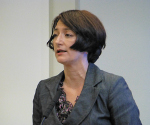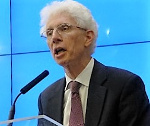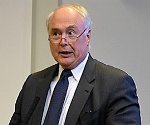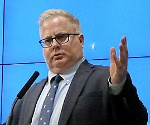Hot Topic: Debating Free Trade’s Impacts
At a recent Brookings Institution–hosted debate, the point on which speakers were perhaps most in agreement was that the question at hand—“Have free trade deals been a net positive for working Americans?”—is not the most relevant question policy analysts should be focusing on as they attempt to present the “best ideas for the next U.S. president.”

International trade has been much discussed by the major party candidates, who currently voice opposition specifically to the Trans-Pacific Partnership (TPP). However, another much-maligned trade deal, the North American Free Trade Agreement (NAFTA), has had a strong record of boosting trade and promoting integrated production platforms among the United States, Canada, and Mexico, argued Brookings senior fellow Mireya Solís. The big problem for the U.S. economy now is largely the result of the China trade shock after it joined the World Trade Organization (WTO), she said. But 85 percent of manufacturing job losses are due to automation, not trade.

Drawing the distinction between trade and trade deals, Brookings senior fellow William A. Galston agreed that China was a bigger problem than NAFTA. In 2001, the United States lost 3.4 million manufacturing jobs, not just due to the increase of imports but also to the offshoring of jobs, he said. While Solís called for better education to help workers become more flexible, Galston argued that many workers—such as a 50-year-old factory worker with a home that is still underwater from the recent recession and with elderly parents to take care of—are not all that flexible.

China is indeed the “elephant in the room,” said Stimson Center distinguished fellow William Reinsch, observing that the United States does not have a free trade agreement with China. But many of the arguments about the effects of trade deals are based on data about goods rather than services, where the United States leads, he said. Positive effects of trade deals include lower prices for consumers, and while U.S. factories have closed down and jobs have gone to Mexico, that is a small portion of the U.S. economy. He reiterated the point that more jobs have been lost to productivity gains from automation. Adjustment assistance programs should be part of U.S. trade policies, he said, adding that workers need to acquire a mix of new skills, not just in STEM areas.

Currency manipulation is another “elephant” in the room of international trade discussions, said Michael Lind, policy director of New America’s economic growth program. As well, free trade agreements “are more like a form of domestic legislation which has been outsourced to diplomats,” he said. An estimated 85 percent of advisors on committees for the TPP are from corporations, where citizens have no influence as they do with Congress, he said. “I would argue that it represents a disempowerment of ordinary Americans by shifting things, which ought to be done through the legislature, to the treaty process.”
As for the future impacts of trade agreements, Galston summarized, “I believe that agreements have been net positives for working Americans in the past, and could again be net positive if the lessons of the present are taken into account in our negotiations and in the provisions of the treaty.” He observed further that the United States has yet to find anything to replace the mass employment manufacturing once provided, “and until we do, we’re in big trouble.”
Reference: Brookings Institution. Download a transcript of the debate (PDF).
Foresight Opportunity
The Fraunhofer Institute for Systems and Innovation Research in Karlsruhe, Germany, seeks an experienced foresight analyst for its Competence Center to work in interdisciplinary teams to acquire, manage, and execute interesting projects for clients from government, the public and private sector, and international institutions. Qualifications include a university degree in social sciences/humanities, economics, or engineering, as well as significant expertise in the field of foresight, including knowledge of scenario processes, roadmapping, and visioning methods and processes. Knowledge and experience in dealing with empirical social research, publication databases, and relevant research and evaluation tools are beneficial. Application deadline is November 11. Contact Dr. Kerstin Cuhls, kerstin.cuhls@isi.fraunhofer.de.
Futurists in the News
• “The forces and factors that worked for Korea and the world for the past 50 years will work no more,” James Dator, director emeritus of the Hawaii Research Center for Futures Studies, warns in an interview with Korea JoongAng Daily. “Continued economic growth with more jobs and more products should no longer be the main goal of Korea, or any country,” he says, as these pursuits are among the forces driving climate change, rising sea levels, global warming, and the food, water, and energy challenges that are the key issues the world is facing. Read “How will the world look in 2036? We asked a futurist” by Kim Jee-Hee, Korea JoongAng Daily (October 24, 2016).
• Economist Robin Hanson, author of The Age of Em, is profiled in the Chronicle Review, which questions whether his view of a future dominated by robotic human emulators is too far ahead of its time. “Like much of the George Mason [University] economics department, Hanson leans libertarian, but he has also dreamed up his own form of government, called ‘futarchy,’” writes David Wescott. “An enthusiastic student describes his true political philosophy as ‘meta, meta-everything’: questioning how we arrive at political philosophies in the first place.” Read “Is This Economist Too Far Ahead of His Time?” by David Wescott, The Chronicle Review (October 16).
• A goal of visioning its future led the city of Minnetonka, Minnesota, to hire futurist consultant Rebecca Ryan of Next Generation Consulting. The suburb is an affluent one but is seeing increasing competition from surrounding areas, Ryan explains. “Nothing is really going wrong in Minnetonka,” Ryan tells the Star Tribune. “[But] what’s Minnetonka going to do to raise its game? They can’t just watch and wait. If they don’t adapt, they’re going to be less relevant.” Read “Looking ahead to the next 20 years, Minnetonka hires a futurist” by Kelly Smith, Star Tribune (July 16, 2016).
• In an interview with the Des Moines Register, DaVinci Institute founder Thomas Frey describes major trends shaping Iowa’s future: farming by drones and other technologies; supercomputing that eliminates risk, disrupting the insurance industry; a skyrocketing need for drone insurance; public transportation dominated by automated vehicles; and a coming technological revolution that creates super employment. Read “6 trends that will shape Iowa’s future. (Hint: Think farm drones)” by Joel Aschbrenner, Des Moines Register (October 20, 2016).

